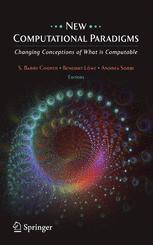

Most ebook files are in PDF format, so you can easily read them using various software such as Foxit Reader or directly on the Google Chrome browser.
Some ebook files are released by publishers in other formats such as .awz, .mobi, .epub, .fb2, etc. You may need to install specific software to read these formats on mobile/PC, such as Calibre.
Please read the tutorial at this link: https://ebookbell.com/faq
We offer FREE conversion to the popular formats you request; however, this may take some time. Therefore, right after payment, please email us, and we will try to provide the service as quickly as possible.
For some exceptional file formats or broken links (if any), please refrain from opening any disputes. Instead, email us first, and we will try to assist within a maximum of 6 hours.
EbookBell Team

4.8
24 reviewsIn recent years, classical computability has expanded beyond its original scope to address issues related to computability and complexity in algebra, analysis, and physics. The deep interconnection between "computation" and "proof" has originated much of the most significant work in constructive mathematics and mathematical logic of the last 70 years. Moreover, the increasingly compelling necessity to deal with computability in the real world (such as computing on continuous data, biological computing, and physical models) has brought focus to new paradigms of computation that are based on biological and physical models. These models address questions of efficiency in a radically new way and even threaten to move the so-called Turing barrier, i.e. the line between the decidable and the un-decidable.
This book examines new developments in the theory and practice of computation from a mathematical perspective, with topics ranging from classical computability to complexity, from biocomputing to quantum computing. The book opens with an introduction by Andrew Hodges, the Turing biographer, who analyzes the pioneering work that anticipated recent developments concerning computation’s allegedly new paradigms. The remaining material covers traditional topics in computability theory such as relative computability, theory of numberings, and domain theory, in addition to topics on the relationships between proof theory, computability, and complexity theory. New paradigms of computation arising from biology and quantum physics are also discussed, as well as the computability of the real numbers and its related issues.
This book is suitable for researchers and graduate students in mathematics, philosophy, and computer science with a special interest in logic and foundational issues. Most useful to graduate students are the survey papers on computable analysis and biological computing. Logicians and theoretical physicists will also benefit from this book.